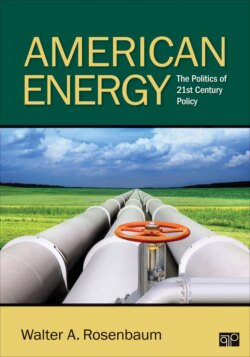Читать книгу American Energy - Walter A. Rosenbaum - Страница 24
На сайте Литреса книга снята с продажи.
Political Partisanship
ОглавлениеNational energy issues since the 1970s have been characterized by a gradually increasing partisan cleavage over policy options between presidents, within Congress and among the public. Such vital energy issues as exploration for petroleum reserves in the Arctic National Wildlife Refuge (ANWR) and the Outer Continental Shelf (OCS), the pace of future fossil fuel mining, the relative priority for renewable and conventional energy, and the credibility of global climate warming now tend to divide Democrats and Republicans in Washington and among the electorate. Proclaiming an energy issue, or a proposed solution, to be a “Democratic” or “Republican” matter, moreover, arms policymakers with an evocative symbol that may attract to policy debate certain segments of the public with strong partisan sympathies who rally partisans behind a proposed solution.43
In general, Republicans in the White House and Congress have been more favorable than Democrats to relaxing environmental restraints on energy development, to accelerated petroleum and other fossil fuel exploration and utilization, to decreased taxation of energy production and, generally, to less governmental involvement in energy markets. Even before Obama’s presidential commission investigating the Gulf disaster submitted its report to Congress in 2011, combative partisanship surfaced. In the House of Representatives, Republicans alleged, and Democrats denied, that the commission’s secret agenda was to promote Democratic efforts to limit, if not prohibit, future offshore energy exploration.44 When the commission subsequently submitted its recommendations to Congress, Democrats and Republicans on the House committee reviewing the report renewed that debate.
Partisanship has, in many instances, also polarized public opinions about the scientific and technical information supporting one energy policy option or another. This partisan politicization has been especially conspicuous in recent years over the credibility of global climate warming and its scientific basis. For example, Republican voters have been considerably more likely than Democrats to disbelieve in the existence of global climate warming, to attribute climate warming (if it occurred) to nonhuman sources, and to question the credibility of climate warming science and scientists.45 When energy science becomes politicized, the resulting debate may be powerfully polarizing, placing scientists and other technical experts under intense pressure to shape their professional opinions in favor of one side or another and thus to compromise their scientific objectivity. The inherent tension between the objectivity essential to scientific inquiry and the partisanship deeply rooted in contemporary conflict over national energy policy now predictably invests conflict over policy options with assertions that one side or another has compromised the integrity of scientific information to its advantage.
